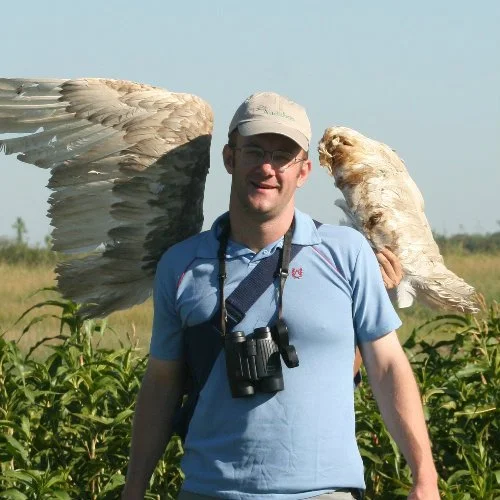Speakers
2026 Speakers
keynote Speaker: Rob Clay
Rob Clay has been active in migratory bird conservation in the Western Hemisphere for more than 20 years. A native of the United Kingdom, his interest in Neotropical birds and conservation began during an undergraduate expedition to Paraguay in 1992, which led to Ph.D. studies of manakins in Costa Rica and Panama.
Prior to joining the Western Hemisphere Reserve Network (WHSRN) Executive Office (and Manomet) in May 2014, Rob worked for BirdLife International as Senior Conservation Manager in the Americas Secretariat. There, he led the development of conservation programs for a wide variety of migratory birds and globally threatened species. He was instrumental in building BirdLife’s Southern Cone Grasslands Alliance, a coalition of cattle ranchers, government agencies, research institutions, and conservation organizations working together in the South American Pampas grasslands.
Through his role at BirdLife, Rob worked closely with WHSRN staff and site partners over the years. He also served on the WHSRN Hemispheric Council, and is a past Chair of the Waterbird Conservation Council, and former Vice President of the Heron Specialist Group (HeronConservation). He is a member of the Executive Committee of the Atlantic Flyway Shorebird Initiative, the Steering Committees of the Pacific and Midcontinent Shorebird Conservation Initiatives, the Americas Steering Committee of the Arctic Migratory Bird Initiative, and a Conference of the Parties Appointed Scientific Councilor for Birds to the Convention on Migratory Species.
In 1997, Rob helped found Guyra Paraguay – now the country’s leading conservation NGO, and he has called Paraguay home ever since (except for two years in Ecuador). Rob and his family live in Asunción, where he conducts regular monitoring of shorebirds at the Asunción Bay WHSRN site.
presenter: Erin Cooper
Erin Cooper, a Wildlife Biologist for the Forest Service, has lived and worked in Cordova for 24 years. Her work has ranged from shorebirds and waterfowl to mountain goats and moose with a focus on ecosystems of the Copper River Delta. Since 2001 she has been a core member of the Copper River International Migratory Bird Initiative, promoting international conservation for migratory birds and their habitats throughout the Pacific Flyway.
presenter: Dotty Widmann
Dotty Widman has been teaching a variety of workshops in Cordova, Alaska through her craft store, The Net Loft, over the past 34 years of owning the shop. She enjoys translating botanical and natural history into fiber art interpretations using wool and yarn, and loves teaching and sharing new techniques as a means to encourage creativity and community.
PRESENTER: RAVEN CUNNINGHAM
is a lifelong Cordovan and advocate for Indigenous stewardship and environmental justice in coastal Alaska. She sits as the Vice Chair of the Native Village of Eyak Tribal Council and Chair of its Natural Resource Advisory Council, where she leads efforts to protect subsistence rights, advance Tribal sovereignty, and uphold traditional stewardship practices.
She also serves as Director of the Tribal Fish and Wildlife Department at the Chugach Regional Resources Commission, promoting Indigenous leadership in sustainable resource management across the Chugach Region.
Raven holds a degree in Alaska Native Studies and Rural Development with a concentration in Natural Resource Management from the University of Alaska Fairbanks. Her work is grounded in both academic knowledge and generations of place-based experience.
In addition to her leadership roles, Raven is an artist and founder of Made by Raven, creating jewelry and clothing rooted in cultural tradition and made with local, sustainable materials.



